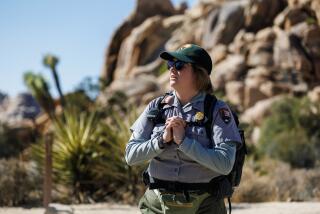Code of the Wild
- Share via
Growing numbers of affluent Americans with leisure time are trekking to every corner of the Earth on nature and adventure tours these days, from the far corners of Alaska to Antarctica and from the jungles of the Amazon to the Himalayas. Too often they harass the rare animals they go to see, trample the plants and leave their trash behind. The damage is done primarily out of ignorance and thoughtlessness. For whatever reason, the negligence puts stress on these special places and diminishes the experience of those to follow.
The National Audubon Society is to be commended for adopting a code of environmental ethics for its travel programs. Every other wilderness or natural history tour program should accept Audubon’s invitation and adopt the code as well. Provisions include protection of fragile habitats visited, maintenance of respectful distances from all forms of wildlife and proper disposal of all waste. Every trip must be led by experienced and responsible guides and naturalists. There will be no purchase or taking of souvenirs of threatened species including ivory from any source, all sea turtle products, most reptile skins and leathers, coral and furs.
The Audubon statement recognizes the inherent conflict between tourist development and the environment. The same problem confronted the Sierra Club early this century when it began to sponsor highly organized High Sierra outings. The more people ventured into the mountains, the more the environment might be subject to damage. But by allowing participants to experience the wilderness, and learning to respect it, club leaders also generated advocates for permanent protective measures. The same notion is true of visitors today to remote portions of the globe. Most of the nations visited will not discourage tourism because of the dollars to be earned. Tour promoters are proliferating.
By insisting on environmental respect and protection, the Audubon Society believes such natural areas can be visited and appreciated, and still be preserved. Public awareness will help spread the conservation ethic. The society will not do business with tour operators who will not subscribe to its new code. Nor should any other responsible organization.
More to Read
Sign up for The Wild
We’ll help you find the best places to hike, bike and run, as well as the perfect silent spots for meditation and yoga.
You may occasionally receive promotional content from the Los Angeles Times.






